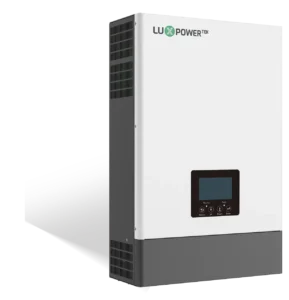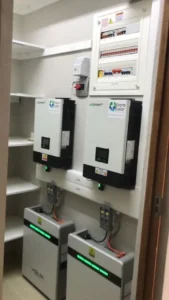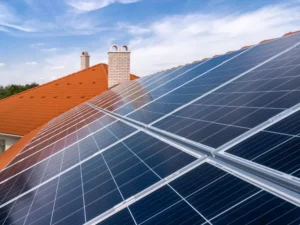The importance of sustainable development has been highlighted in the face of the world’s urgent problems in the 21st century. The United Nations presented a comprehensive framework known as the Sustainable Development Goals (SDGs). These goals aim to address global concerns. such as poverty, hunger, climate change, and the lack of access to clean energy. At the same time, firms and businesses are seeing the value of CSR in promoting beneficial changes in society and the natural world.
In this light, solar inverters have emerged as a key factor in accomplishing both the SDGs and CSR goals. In photovoltaic (PV) systems, solar inverters play a critical role. They transform the energy harvested from the sun into useable power. By using the sun’s energy, they help lessen the effects of climate change. This is done by decreasing emissions and increasing the availability of clean, cheap power. This article, therefore, explores how solar inverters can help achieve the SDGs and contribute to CSR efforts. We’ll look at the ways in which these simple tools may help spread renewable energy, improve local economies, and inspire change on a global scale.
Aligning solar inverters with SDGs

As we learn more about solar inverters and their contribution to a sustainable future, we see that they coincide with many of the SDGs. Solar inverters play a significant role in solving critical global concerns. They can help build an environmentally friendly future by harvesting solar energy. They also encourage the usage of clean energy sources. Let’s look at the various SDGs that solar inverters help achieve.
SDG 13: Reducing Greenhouse Gas Emissions and Combating Climate Change
Solar inverters are essential to solar power systems, which generate renewable energy in a clean and sustainable way. The usage of solar inverters may lessen the impact on the environment caused by the combustion of fossil fuels. They increase the efficiency with which sunshine is converted into energy. Therefore, the goal of reducing the effects of climate change (SDG 13) is explicitly addressed here.
Using Clean Energy Conversion to mitigate Environmental Impact
Solar energy is a renewable resource that produces almost little pollution when used. With solar inverters installed in PV systems, we can guarantee that our energy output has a minimal impact on the environment. Consequently, the use of solar energy by enterprises and communities has a positive effect on the environment. They significantly help achieve the SDG 13.
SDG 7: Access to Affordable and Clean Energy
Community solar inverters for decentralized energy
Solar inverters make distributed power production possible in areas with unreliable grid supply. Even in outlying places, communities may become energy independent by using solar resources. SDG 7 aims to provide people with access to modern, cheap, dependable, and sustainable energy sources. Integration of solar invertors in power systems allows communities to accomplish this goal.
Bridging the energy gap in remote areas
Energy poverty is a major barrier to economic growth and universal access to basic services in many parts of the world. Therefore, clean and cost-effective energy solutions should be brought to unserved regions. The use of solar inverters and solar PV systems can facilitate this. This is in line with SDG 7’s goals of providing more low-income areas with access to renewable energy.
SDG 8: Creating Decent Work and Economic Growth
Enhancing job opportunities in the renewable energy sector
Solar inverters promote the growth of the solar power industry. This in turn benefits businesses and workers along the renewable energy value chain. Additionally, the solar sector promotes job creation and skill development across the board. This is achieved from production and installation to operations and maintenance. It helps achieve SDG 8’s objective of ensuring access to decent work, employment, and economic development.
Fostering local economic development
Collaboration between regional enterprises and labour is commonplace in the solar energy industry. Moreover, local investment and new business formation are both boosted by this cooperative effort. Businesses help their local communities thrive by supporting solar inverter-powered sustainable energy initiatives.
Solar Inverters and Corporate Social Responsibility (CSR)

Solar inverters possess revolutionary potential in responding furthering sustainable development. This is evident by their congruence with certain SDGs. Businesses may have a positive social and environmental effect while also contributing to these aims. By adopting solar energy solutions as part of their CSR efforts, they can maximize this impact. In this section, let’s examine how businesses use solar inverters as part of their CSR.
The term “Corporate Social Responsibility” (CSR) now refers to much more than just a charitable act. It’s become fundamental to the operations of several thriving companies. Responsible business conduct now necessitates the adoption of sustainable practices. The incorporation of renewable energy efforts into CSR programs is integral to this. Sustainable development objectives may be integrated into business strategies. In addition, they can gain different advantages by using solar inverters, which play a crucial part in these efforts. Here, we’ll look at how solar inverters fit into CSR efforts.
A. Incorporation of Renewable Energy Goals into CSR Strategies
Adopting renewable energy targets is one way for businesses to show they care about corporate social responsibility. Also, they can achieve this by incorporating solar energy projects into their operations. Installing power systems with solar inverters helps organizations reduce their carbon footprint. Additionally, they may reduce their use of fossil fuels and other nonrenewable energy sources as well. Taking such measures demonstrates a real dedication to environmentally responsible methods.
B. Enhancing Brand Reputation and Stakeholder Engagement
Embracing solar inverters as part of a comprehensive CSR strategy enhances a company’s reputation. Stakeholders, including customers, investors, and employees, value responsible companies. These are companies that actively contribute to environmental preservation and social welfare. By investing in solar energy, companies can foster stronger relationships with socially conscious customers.
C. Measurable Impact on Communities and the Environment
Reduced Carbon Emissions
Companies leveraging solar inverters in their CSR can track and report the reduction in carbon emissions. This results from the shift to clean energy. These verifiable results reinforce the organization’s commitment to sustainability and climate action.
Community Empowerment
Projects powered by solar inverters can lead to socio-economic improvements in communities. Education, health care, and the ability to make a living are all improved by constant access to power. Thereby, they contribute to various SDGs, including SDG 1 (No Poverty) and SDG 3 (Good Health and Well-being).

Future Outlook and Potential for Scaling Up
The future of solar inverters holds great potential as renewable energy adoption gains momentum. The integration of solar inverters in achieving SDGs and driving CSR initiatives can be fostered by:
- Technological advancements
- Evolving policy landscapes
- Growing public awareness
Let’s explore the future outlook for solar inverters and the potential for scaling up their implementation.
A. Technological Advancements in Solar Inverters
Enhanced Efficiency
Ongoing research and development is focused on increasing the efficiency of solar inverters. Thereby, they enable them to extract more power from solar panels and maximize energy output.
Energy Storage Integration
Integration of solar inverters with storage solutions, such as batteries, is becoming prevalent. This advancement allows businesses and communities to store excess energy for later use. Consequently, their energy self-sufficiency and grid resilience improve.
Smart Grid Integration
Solar inverters will play a key role in enabling smart grid integration. They can facilitate two-way communication between renewable energy sources, electrical grids, and end-users. This intelligent grid management will optimize energy distribution and support stable grid operation.
B. Global Trends in Renewable Energy Adoption and Implications for SDGs
Market Growth and Cost Competitiveness
The cost competitiveness of solar energy will drive solar inverters’ adoption. Also, supportive policies and incentives can lead to favorable results.
Decentralization and Energy Democracy
The decentralization of energy generation is enabled by solar inverters. The ability to meet local energy demands is restored to local communities. As a result, their dependency on centralized power systems is reduced.
Rural Electrification and Inclusive Development
Solar inverters play a vital role in rural electrification initiatives. It allows previously unreached places to benefit from reliable, low-cost electricity. Thereby, they support SDG 7 (Affordable and Clean Energy) and SDG 1 (No Poverty).
C. Collaborative Efforts for Transitioning to Renewable Energy
Public-Private Partnerships
Collaborative efforts are instrumental in scaling up solar energy projects. Consequently, it fosters sustainable development.
Corporate Commitments to Sustainability
There is a growing trend of corporations pledging to achieve carbon neutrality. This will encourage people to switch to renewable energy sources. It is expected to drive increased adoption of solar inverters as part of CSR initiatives.
International Cooperation and Climate Agreements
Global agreements and initiatives, such as the Paris Agreement, are imperative. These initiatives promote international cooperation to combat climate change. This helps in accelerating the transition to renewable energy. Consequently, it creates a conducive environment for solar inverter deployment.
Conclusion
In conclusion, solar inverters play a pivotal role in achieving SDGs and supporting CSR initiatives. As technology advances, global efforts to combat climate change intensify. Consequently, solar inverters’ role will continue to expand. This will drive sustainable energy transformation. By integrating solar inverters into CSR strategies, businesses can promote a positive change. They have great potential to make the future more sustainable, prosperous, and socially conscious.

